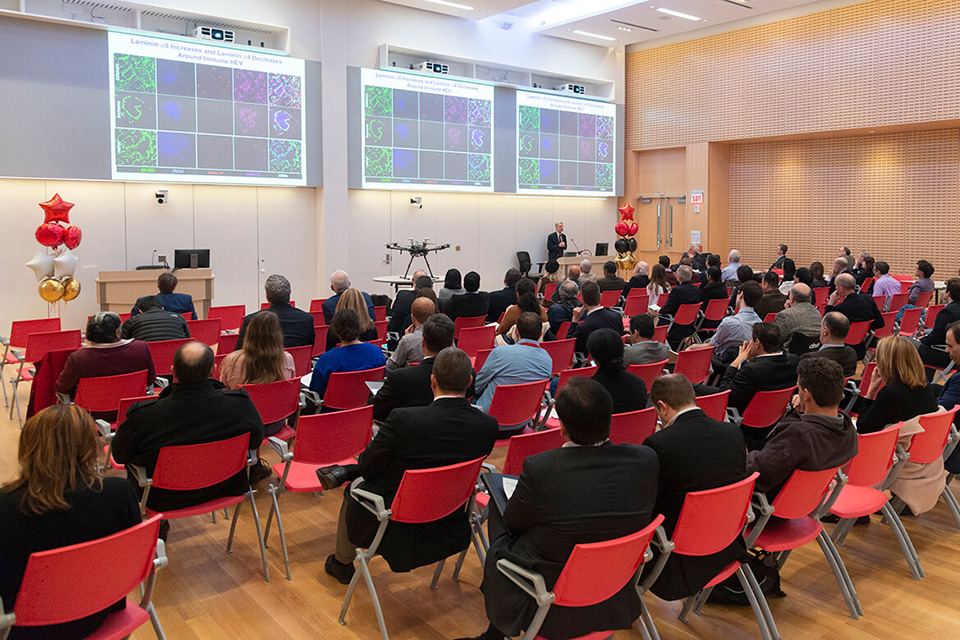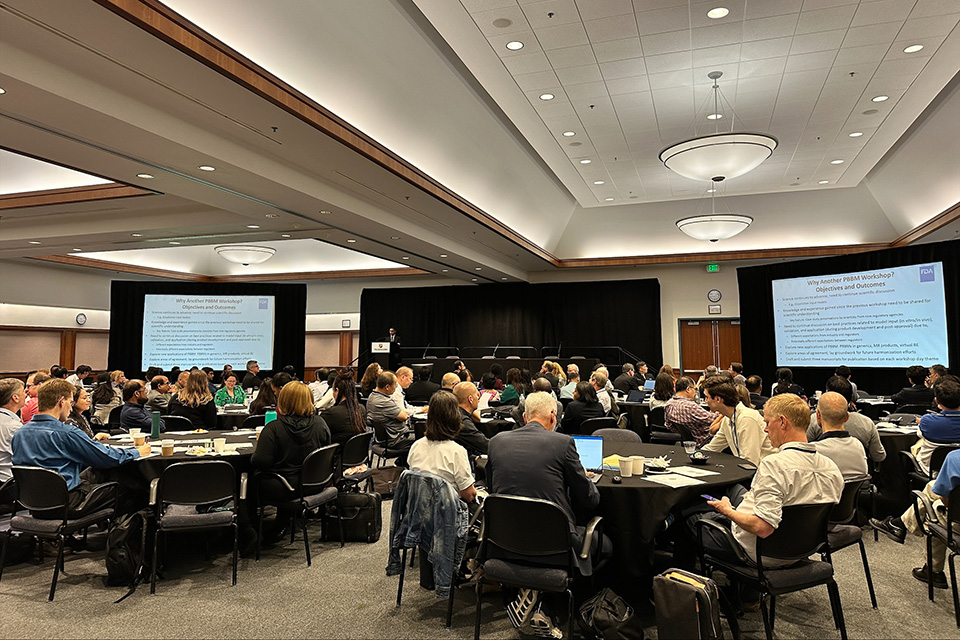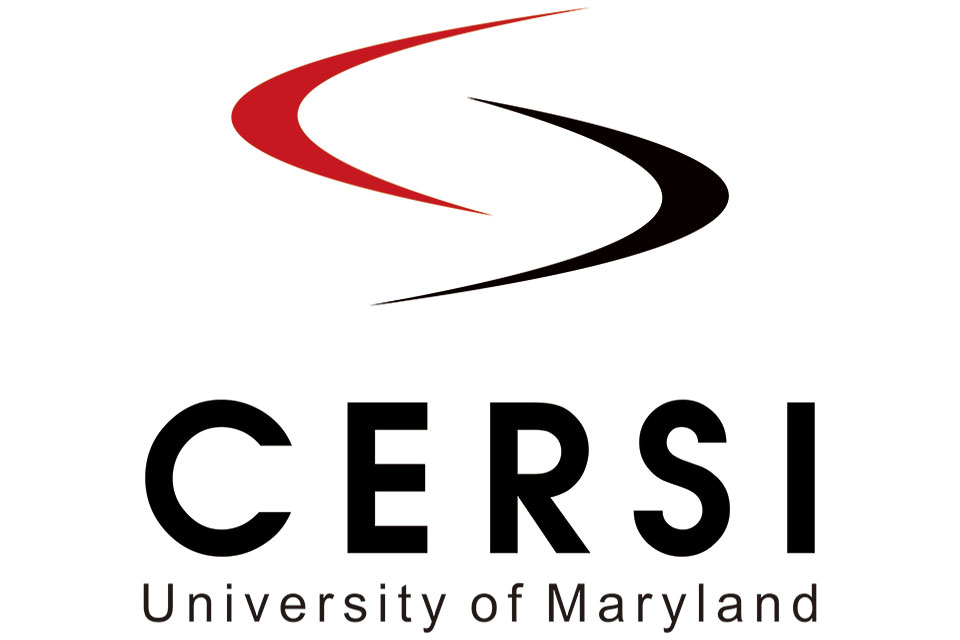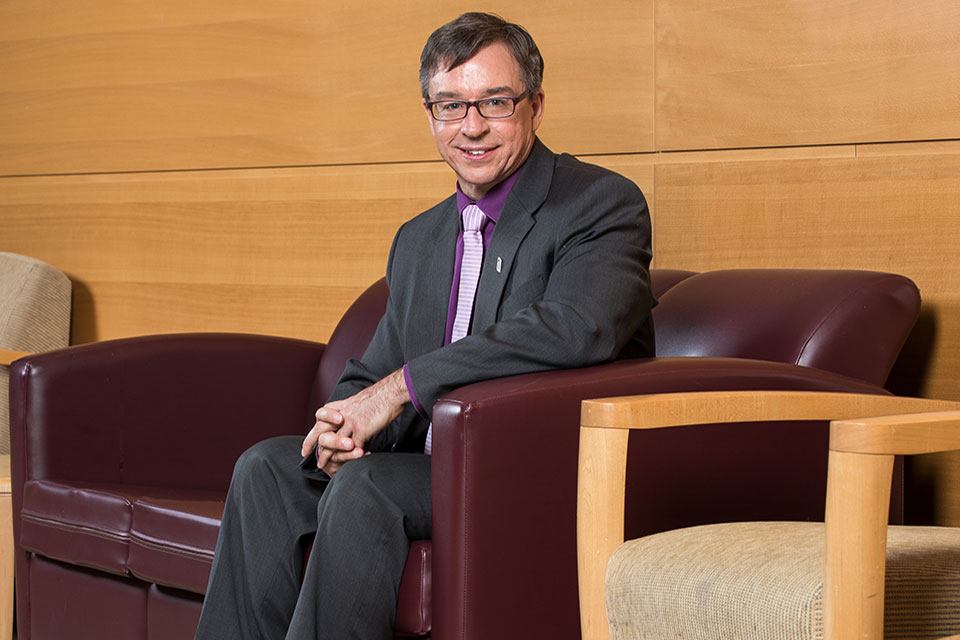Researchers Get Five-Year Funding Renewal from FDA CERSI Program
M-CERSI is a collaboration between the University of Maryland School of Pharmacy and the University of Maryland, College Park.

By Randolph Fillmore
April 15, 2024
In August 2023, the U.S. Food and Drug Administration (FDA) renewed funding for the University of Maryland Center of Excellence in Regulatory Science and Innovation (M-CERSI) with a five-year, $50 million cooperative agreement. The innovative FDA/M-CERSI collaboration supports regulatory research but also sponsors workshops, lectures, and seminars aimed at advancing and promoting regulatory science. The events offer networking opportunities for experts from academia, industrial consortia, FDA scientists, and the public.
M-CERSI is one of the nation’s five FDA-funded CERSI programs, and the oldest, established in 2011. It is a collaboration between the University of Maryland School of Pharmacy and the University of Maryland, College Park. M-CERSI is co-led by James Polli, PhD, the Shangraw/Noxell Endowed Chair in Industrial Pharmacy and Pharmaceutics in the Department of Pharmaceutical Sciences (PSC) at the School of Pharmacy (SOP), and William Bentley, PhD, the Robert E. Fischell Distinguished Chair in Engineering and director of the Robert E. Fischell Institute for Biomedical Devices at the University of Maryland, College Park (UMCP).
“We are honored by the FDA’s decision to renew M-CERSI for another five years,” says Polli, who is one of six faculty from the University of Maryland, Baltimore (UMB) and UMCP recently named MPower Professors by the University of Maryland Strategic Partnership: MPowering the State (MPower). “The refunding reinforces the FDA’s commitment to advancing regulatory science and allows M-CERSI to continue our partnership with UMCP, the FDA, and the pharmaceutical industry, and fosters work in evaluating the safety and efficacy of new drugs, biologics, and medical devices.”
Bentley concurs. “I am truly excited that our efforts to bridge disciplines and campuses to develop the science that underpins regulatory practice have been recognized — not only by our students, faculty, and staff but also by the FDA,” Bentley says. “It is my hope that the next five years will bring us to even greater heights as a nexus for health-related activities between our institutions and the FDA.”
According to Polli and Bentley, M-CERSI focuses on modernizing and improving how drugs and medical devices are reviewed and evaluated. Researchers from both institutions work closely with the FDA in developing new regulatory tools, standards, and approaches for assessing safety, efficacy, quality, and performance for FDA-regulated products. Bentley, Polli, and M-CERSI-funded researchers work closely with Tracy Chen, PhD, DABT, a senior advisor at the FDA who leads the CERSI program, and with Kristin A. Sepúlveda, MBA, an FDA program official.
According to Sepúlveda, the CERSI program’s cooperative funding mechanism serves as a conduit of regulatory scientific exchange, education, and outreach that have a high public health impact.
“The CERSI program fosters innovative approaches to advancing regulatory science through collaborations and interactions between CERSI scientists, who are principal investigators and co-investigators, FDA scientific experts, and funding offices,” says Sepúlveda.
The FDA defines regulatory science as a science for developing tools, standards, and approaches to assess the safety, efficacy, quality, and performance of products regulated by the FDA. Accordingly, M-CERSI activities target one or more focus areas of the FDA’s Regulatory Science Framework. The goal of this framework is “to harness regulatory science research that directly aligns with FDA’s mission to modernize development and evolution of FDA-regulated products,” which include FDA-regulated products, such as medical devices, drugs, biologics, combination products, veterinary medicine, food, cosmetics, dietary supplements, and tobacco products.
Workshops, Lectures Serve Science, Public
According to Bentley, there have been 76 M-CERSI workshops since 2012, with almost 25,000 attendees. Recent topics have included quantitative systems pharmacology-informed rare disease drug development, artificial intelligence for precision medicine, biosimilars, and co-processed active pharmaceutical ingredients. Many workshops have resulted in reports to guide subsequent research aims.
How are the topics decided upon for M-CERSI workshops and lectures?
“We have a developed process, including a form and opportunity for scientists from our two universities and the FDA to propose workshop ideas,” says Polli. “A call for workshop proposals is disseminated each year. M-CERSI workshop proposals must have a proposed chair from the University of Maryland and the FDA. A rationale for the workshop and a tentative agenda is required. Proposals are also vetted by a group from various FDA centers. Workshops typically occur about a year after their initial proposition.”
The M-CERSI workshops are held in a hybrid format, available both in-person and virtually.
Supported by M-CERSI grants, researchers at SOP and UMCP are currently collaborating with the FDA on approximately 25 research projects across several FDA centers, such as those for drugs, biologics, medical devices, and tobacco.
Many projects underway since the last funding cycle are continuing under the recent refunding. In research that started in 2019, Maureen Kane, PhD, professor in PSC at SOP and executive director of the School’s Mass Spectrometry Center, will continue working with her co-principal investigators at the University of Maryland School of Medicine (UMSOM) and SOP on a project to identify and develop diagnostic biomarkers for traumatic brain injury (TBI).
Kane, working with Marta Lipinski, PhD, associate professor in the Department of Anesthesiology (UMSOM); Chinmoy Sarkar, PhD, assistant professor in the Department of Anesthesiology (UMSOM); and Jace Jones, PhD, assistant professor in PSC and associate director of the School of Pharmacy’s Mass Spectrometry Center, have identified specific lipids in a patient’s blood that can be measured and then serve as minimally invasive, quantitative diagnostic biomarkers to help detect or confirm the presence and severity of TBI.
“We are very pleased to continue our fruitful collaboration with the FDA and working through M-CERSI toward developing these biomarkers for TBI,” says Kane. “The impact of this project will help with the diagnosis and assessment of the severity of TBI, which can then help enroll patients into drug clinical trials for TBI.”
At UMCP, Stephen Jay, PhD, associate professor in the Fischell Department of Bioengineering, is the principal investigator on continuing work to apply additive manufacturing for purifying bacterial extracellular vesicles (EV), which represent a new modality for drug delivery and biological therapy.
While the development of EV production is limited by a lack of large-scale manufacturing, quality control, and characterization issues, the research aims at blending EV therapeutics with advanced biomanufacturing technologies, such as 3D printing and microfluidics.
Clifford Rossi, PhD, professor and executive in residence at the Robert H. Smith School of Business at UMCP, is continuing an M-CERSI study on the economics of pharmaceutical facility practice of continuous manufacturing (CM) versus batch manufacturing. Rossi’s research is suggesting that CM clearly deserves consideration in pharmaceutical plant investment decisions and that investing in domestic CM facilities, at least for U.S.-based manufacturing sites producing oral, solid dose pharmaceutical products, could further reduce the potential for supply chain disruptions caused by global risk events affecting pharmaceutical manufacturing as happened during the COVID-19 pandemic.
New studies also are beginning under the M-CERSI refunding.
Danya Qato, PhD, PharmD, MPH, an associate professor in the Department of Practice, Sciences, and Health Outcomes Research at SOP, is leveraging data-informed models to identify optimal opioid use disorder treatment trajectories. Sarah Murthi, MD, professor of surgery at UMSOM, and Amitabh Varshney, dean of the College of Computer, Mathematical and Natural Sciences at UMCP, are assessing safety and performance issues with extended reality tele-mentoring of image-guided clinically important procedures.
America’s Got Regulatory Science Talent
Besides funding research, workshops, and lectures, M-CERSI sponsors an annual student competition called America’s Got Regulatory Science Talent. The competition aims at promoting student interest in regulatory science and in developing new tools, standards, and approaches to assess the safety, efficacy, quality, and performance of FDA-regulated products.
The most recent competition was held in January, with three FDA staff scientists serving as judges. The winning team was PocketPeds, which proposed an app for patients to individualize pediatric dosing for over-thecounter medications. Team members were SOP student pharmacists Jiwon Oh, Danielle Doan, Oanh Hoang, and Christina Nguyen. The team’s mentor was FDA staff scientist Erin Wood, PhD.
“The team gave a great presentation and proposed a new app that addresses the need for improved dosing accuracy,” says Polli. “Surveys show that it is difficult for parents to accurately dose kids, so the proposed app — with calculations and visual cues — promises to be a big help.”
The winning team’s efforts fit well with the goals of the competition, suggests Bentley.
“Often, winners of the competition devise information-based systems for improving health and/or regulatory practice,” explains Bentley. “This year UMCP brought together its App Development Club, comprised of computer science students, with the groups in the talent competition to devise appdriven solutions. Perhaps a commercial product will result since M-CERSI is all about translating ideas into commercial practice.”
Looking Forward
Bentley says that he and Polli are looking forward to the next five years of M-CERSI with great enthusiasm and energy.
“While our universities have benefited from M-CERSI, I like to think the FDA and our health care systems in general have also benefited,” says Bentley. “One forward-looking theme that we are advancing is at the intersection between information processing, devices, and biological systems. Open lines of communication between devices and biology have long benefited our health, such as technologies like EKG and defibrillators. But new pathways that connect at the molecular level, such as oxidative stress and genetic systems, are opening.
“There will be many significant advantages to advancing this emerging field; connecting with the FDA will ensure technological developments are undertaken with an eye toward their regulatory acceptance — and this is key.”
This article originally appeared in the Spring 2024 issue of Capsule Magazine.



